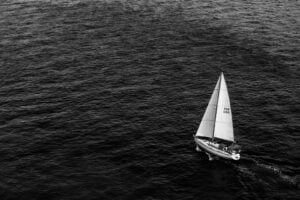The rivers and canals that criss-cross France represent an exceptional heritage and a vital network for goods transport, river tourism and water-based leisure activities. But this seemingly free space is actually governed by a set of sometimes complex rules, designed to ensure the safety of all and the preservation of this environment. Whether you're an experienced sailor, a passenger boat captain or just a weekend boater, a minimum knowledge of river regulations is essential. This article provides an overview of the essential points to master if you want to navigate French inland waters with complete peace of mind. Visit navigation licence regulations is one of the fundamental aspects you need to know in order to avoid any fines and ensure safe navigation. It is essential to find out about the different types of licence required, depending on the capacity and type of boat you wish to pilot. Complying with these regulations not only protects your own safety, but also that of other waterway users. It is also crucial to familiarise yourself with the river navigation rulesThese rules govern the behaviour to be adopted according to weather conditions and the specific characteristics of the waterways. By respecting these rules, everyone can contribute to a harmonious cohabitation between the different users of the waterways, whether professionals or water sports enthusiasts. Finally, increased vigilance and good communication with other boaters are essential to guaranteeing the safety of all on inland waterways.
The rules of the game: the navigation police
Sailing can't be improvised. Traffic on waterways is governed by rules of "good conduct", rather like the highway code on land. The basic text is the General Police Regulations for Inland Navigation (RGP), supplemented by the Transport Code and local regulations specific to certain waterways. What are the key points? Firstly, there are precise rules of the road: light and sound signals for boats, priorities when crossing (in general, a boat travelling downstream has priority over a boat travelling upstream), conditions for overtaking, and what to do when approaching locks and bridges. Parking is also regulated: you can't just moor up anywhere or in any way. Care must be taken not to interfere with navigation and to use solid moorings capable of adapting to changes in water level. Finally, there are restrictions on the size of boats (length, beam, draught) and their speed, depending on the characteristics of the waterway. Disregarding these rules can result in penalties, including traffic offences if the public domain is affected (damage, obstruction, disruptive parking).
The boat and its pilot: essential documents
In addition to traffic regulations, the boat itself and the person operating it must comply with administrative and technical requirements. All boats (except very small craft) must hold an official navigation permit attesting to their compliance with safety standards. For boats carrying goods, this is usually the Community Inland Navigation Certificate (harmonised at European level) or, in some cases, a national Boat Certificate. For those carrying more than twelve passengers, a specific Navigation Permit is required, with regular technical inspections. These documents are issued after technical inspections by specialist committees.
As for the pilot, a Certificate of Competence is required to drive a commercial vessel (goods or more than twelve passengers). To obtain this, you need to meet certain conditions relating to age, medical fitness and professional experience, and pass a theoretical and practical examination. Fortunately, European harmonisation means that many foreign certificates and the Rhine Patent are now recognised. For passenger boats, an additional qualification, the Attestation Spéciale "Passagers", is often required for the driver or a crew member, guaranteeing specific training in the safety of people on board. The crew must also be sufficient in number to ensure safety, with at least one qualified driver and one deckhand on most motorboats.
When things go wrong: boarding and assistance
Despite all precautions, an incident can still occur. In the event of a collision between two river boats, a specific law from 1934 applies (unless a seagoing vessel is involved, in which case maritime law prevails). Its fundamental principle is liability for proven fault: just because you've been hit doesn't mean you're automatically compensated. You have to prove fault on the part of the other party (failure to comply with the rules, poor manoeuvring, etc.). If both boats are at fault, liability is shared according to the seriousness of the faults. If no fault is proven, or in the event of force majeure, each party bears its own damages.
Another aspect concerns assistance. The RGP imposes a duty to come to the assistance of any boat in danger, as long as this does not endanger one's own boat. But unlike maritime law, there is no general law in French river law that organises the remuneration of this assistant. However, the courts tend to regard assistance as a tacit contract, allowing fair compensation to be awarded to the person who rendered assistance, taking into account the costs incurred, the risks taken and the service rendered.
River law is technical and its implications can be far-reaching. For a personalised analysis of your situation or legal advice, our team is at your disposal.
Frequently asked questions
What are the main rules to be aware of when sailing in France?
The General Police Regulations for Inland Navigation (RGP) are the essential text that sets out the rules for traffic and parking on most French inland waterways.
Do I need a licence to drive a barge or passenger boat?
Yes, you need a Certificate of Competence to drive a commercial boat (carrying goods or more than 12 passengers).
Do all boats need a "navigation permit"?
Most boats (except very small craft) require an official navigation document (Community Certificate, Boat Certificate, Navigation Licence, etc.) attesting to their technical compliance.
Who has the right of way when crossing a canal or river?
As a general rule, the "downstream" boat (moving downstream or away from the reach on a canal) has priority over the "upstream" boat.
Can I park my boat anywhere?
No, parking is regulated. You need to choose an authorised place, not interfere with navigation and tie up securely, taking into account variations in water level.
What are the risks of not complying with the navigation rules?
Penalties can range from fines (contraventions de grande voirie if the public domain is infringed) to immobilisation of the boat, and civil liability in the event of an accident.
Who is liable if two boats collide?
Liability is based on proven fault. If only one fault is proven, the person at fault is liable; if both have committed a fault, liability is shared.
Do I have to rescue a boat in difficulty?
Yes, the RGP imposes a duty to assist any boat in danger, as long as this does not compromise the safety of your own boat.
If I help another boat, will I be compensated?
There is no automatic right to remuneration under general river law, but case law may award fair compensation on the basis of an implied contract of assistance.
What is the river certificate of competency?
This is the compulsory 'driving licence' for piloting commercial vessels (goods or transporting more than 12 passengers) on inland waters.




